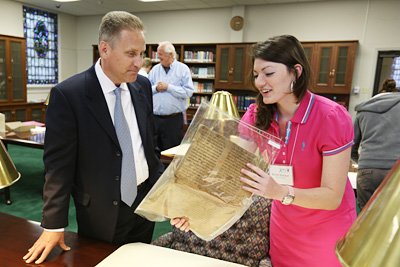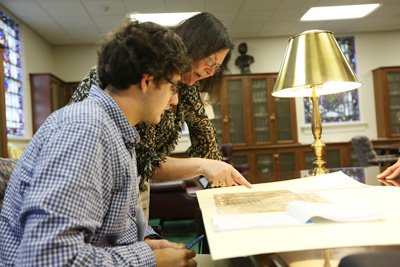WACO—Armed with a newly awarded master of divinity degree and with experience as an associate pastor under his belt, Paul DuPont turned wrestler during a recent week's visit to Baylor University—wrestling with Hebrew and Greek languages in ancient documents.

Rachel Butcher of Baylor University shows an ancient text to Steve Green, president of Hobby Lobby, during Logos at Baylor University, an international  summer institute in which leading scholars mentor undergraduates and graduates in hands-on research of rare manuscripts and artifacts. The items were made available for study by Green, who owns a large private collection of biblical artifacts. The institute is part of the Green Scholars Initiative, a program of the Institute for Studies of Religion at Baylor. (PHOTO/Matthew Minard/Baylor University)
|
DuPont was one of 31 international students chosen to attend the first-ever Logos Institute at Baylor University—a summer institute for university and seminary students eager to pore over papyrus and parchment texts, contemplate universal questions, worship, pray and learn to defend their Christian faith.
"I'm used to letters being typed all nicely by the computer," said DuPont, an aspiring doctoral student at the Charlotte, N.C., campus of Gordon-Conwell Theological Seminary. "I didn't realize how challenging it would be because of fading and missing pieces on the manuscript."
But he plunged into the task, joining other students doing hands-on research with scholar-mentors in textual studies, biblical studies, classics, Christian philosophy and apologetics.
The institute is the vision of Christian businessman Steve Green, president of Hobby Lobby, who loaned items from The Green Collection. In less than three years, he has amassed a priceless collection of more than 40,000 rare texts and artifacts, including clay tablets, scrolls and Scripture on papyrus and animal parchment.
The institute is part of the Green Scholars Initiative, a program of the Institute for Studies of Religion at Baylor expected eventually to include more than 100 universities. Green provided scholarships for students to travel to Baylor from the United States, the United Kingdom and Canada.
"You'll hear a lot of academics here—and then you'll hear me," Green told students and mentors at an evening session. "We're here because of our love of a book (the Bible), and we want to share the story with the world.
 Sign up for our weekly edition and get all our headlines in your inbox on ThursdaysAndrew Camp of Wake Forest University examines rare document with Michelle Brown, professor of medieval manuscript studies at the University of London, during Logos at Baylor University. Logos is an international summer institute and is part of the Green Scholars Initiative, a program of the Institute for Studies of Religion at Baylor. (PHOTO/Matthew Minard/Baylor University)
|
"What we're focusing on is reliability. I'm not interested in scholars that are intentionally trying to discredit God's word; I'm also not interested in people who try to embellish God's word. … All we need to do is take the evidence that's there, present it without embellishment to the world, and say, 'Make your choice.'"
At one workshop, students donned plastic gloves before removing fragile Latin texts from protective covers.
"Read in Latin, make a transcript in Latin, use a computer program for a line or two so see if you can locate it and find a description of what we have," said David Lyle Jeffrey, distinguished professor of literature and the humanities in Baylor's Honors College and distinguished senior fellow and director of manuscript research in Scripture and tradition at Baylor's Institute for Studies of Religion.
"If people are moaning and groaning and get absolutely stuck, I'll help you, but I want you to rely on each other," he said. "I'll give you some things that have been identified, but there are some humdingers that haven't been. Are you game?"
They were.
"Having a community like this has been incredible," said Cambridge University sophomore Suzie Millar, a theology major, who worked with a group studying Genesis 32 in the Dead Sea Scrolls. "It's exciting to see the oldest versions of the Scriptures that we have."
Some manuscripts are significant because "they help to fill in the picture we have of the ancient world, including the world of the Bible," said Jeff Fish, associate professor of classics at Baylor. "With documentary papyri in particular, we get a look at the daily life and language of ordinary people. In effect, through private letters and other documents, we can eavesdrop on the ancients."
Scholars also mentored students editing some of the earliest fragments of the New Testament, with some dating to the second century, Fish said. Other discoveries are fragments of copies of some of St. Augustine's commentaries on John's Gospel and the Psalms, Jeffrey said.
Lori Baker, associate professor of anthropology at Baylor, told how radiocarbon dating and DNA analysis are used to date and analyze animal parchments and papyri.
"Dating the inks needs to be done to be sure the writing is as old as the parchment, too," she said. "In the seventh and ninth centuries, many were scrubbed and scoured to be used for new writing. … DNA from the parchment can tell us about the animals and, through them, the people who kept and bred these animals."
Ancient DNA is degraded and fragmented, making it difficult to analyze, she said. Despite the problems, "technology is changing the game."
A take-away message for young scholars came from Darin Davis, assistant professor of philosophy and director of the Institute for Faith and Learning at Baylor.
"We're called to connect the dots between ourselves and others in different fields and academic disciplines," he said. "Christians are not called to collaborate on interdisciplinary research because it is vogue, but because all truth is connected to God. The next generation of faithful scholars need to be seekers of wisdom who share it with God's people everywhere. It's not ours to stock up for ourselves."
















We seek to connect God’s story and God’s people around the world. To learn more about God’s story, click here.
Send comments and feedback to Eric Black, our editor. For comments to be published, please specify “letter to the editor.” Maximum length for publication is 300 words.